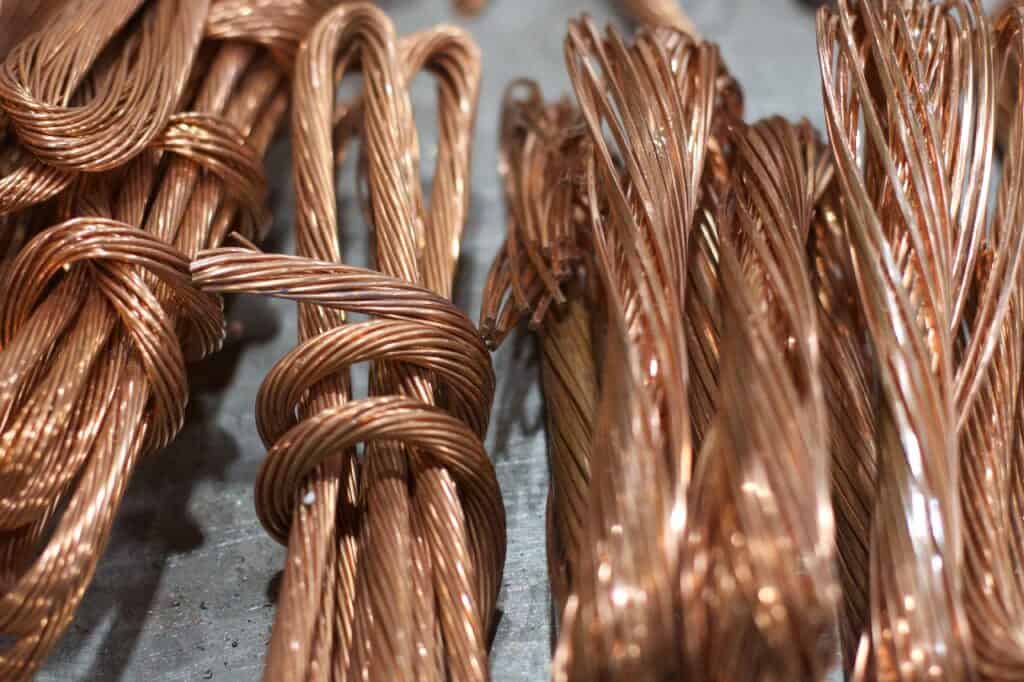One of the most commonly used elements in electronics, communications equipment, and cabling is copper. Copper is a relatively low-cost material that is very “ductile” (that means it can easily be made into rods or wires) that conducts electricity easily and thus, it’s perfect for computing and more. But is copper flammable and if so is our electronic gear a fire hazard?
Copper can catch fire but is not considered to be a highly flammable material. It will ignite around 1030 degrees Celsius (1886 Fahrenheit) and melt at approximately 1084 degrees Celsius (1984 Fahrenheit). This makes it a relatively low fire hazard.
But that doesn’t mean that it can’t burn, as most things will at high enough temperatures. Let’s take a closer look at copper and its flammability.
Your # 1 priority is keeping your family safe. As a firefighter, I recommend everyone has updated smoke detectors that don’t require battery changes, like these ones from Kidde, a fire extinguisher, like this one from Amerex, and a fire escape ladder if you have bedrooms above the first floor, I recommend this one from Hausse.
Also read: What Makes Something Flammable?
Copper Flammability

Like most metals, copper is solid and while it has a relatively low melting point for a metal, but it does not ignite at commonly encountered temperatures and is therefore not flammable.
Copper won’t burn in the air and is not considered to be a fire risk as long as it’s kept as wire, solid sheets, etc.
However, if copper is divided finely into a powdered form, things become a little different.
Powders and dust have a very high surface area to volume ratio and are much easier to burn than solid materials.
Copper powder is considered to be an explosion hazard and care should be taken to avoid placing it anywhere near a naked flame.
Also read: Is Dust Flammable? When To Worry…
Does It Expand When Heated?
Yes, copper expands when heated but you’d be hard-pressed to notice the expansion of copper.
For every degree Fahrenheit that it is exposed to (over 70 degrees Fahrenheit), it expands at about 0.00000094”.
In fact, by the time copper melts, it won’t have expanded enough for you to be able to measure it with a ruler.
Also read: Is Silver Flammable?
What Happens If You Burn Copper?
However, as we said at the start, you can burn copper and if you were to take a little of that explosive copper powder that we mentioned and threw it in a Bunsen burner flame (or indeed, any flame that was hot enough), it would burn and become copper oxide.
Also read: Is Magnesium Flammable? Extreme Metal Fires
What Color Is It When Burned?
Copper burns with a green-blue flame that is quite distinctive.
In fact, it’s so distinctive that it’s an early test in qualitative chemistry (a form of chemistry which tries to identify what chemicals are present in something) to determine if copper ions are present.
Take a look:
Does Copper Melt?
Yes, as we’ve said in the previous section, copper does melt, and it does so at a temperature of 1084.62 degrees Celsius or 1984.32 Fahrenheit!
This means you don’t need to worry about copper melting if you leave it lying around in the home, though it can melt in a house fire or an office fire if the blaze becomes hot enough.
Also read: House Fire Temperature: How Hot Does It Get?
Can I Melt Down Pennies And Sell The Copper?
A US penny until 1982 was up to 95% copper and up to 5% zinc and yes, if you had the right equipment at home, you could, indeed, melt the penny and extract the copper.
And in one of those bizarre moments of economics, the copper you would extract is worth about 2.5 cents.
So, in theory, you would make a 1.5 cent profit on every penny that you melted down for copper and start accumulating a bunch of zinc that you could sell too.
Unfortunately, there’s one problem with this get-rich-quick scheme.
It’s illegal to melt down a US penny and the penalty for doing so is fairly severe.
So, while you can melt down pennies and sell the copper, you really shouldn’t unless you really like prison food.
And don’t even think about melting down pennies made after 1982, those contain only 2.5% copper and you’d make a huge loss trying to sell the copper from them.
Also read: Is Steel Wool Flammable?
Will It Boil?
Copper can boil, but at temperatures of 2595 degrees Celsius or 4703 degrees Fahrenheit and these are temperatures that are substantially hotter than most fires you will encounter in daily life.
So, while copper can boil, it’s not something that you need to worry about very much.
Is Burning Copper Toxic/Poisonous?
This is a complicated question.
Copper, which is slowly forming a copper oxide on the exterior is certainly no threat to your health, but if copper is burning enough to release fumes then it is potentially toxic.
This is why it’s a complicated question to say whether burning copper is toxic or not.
Copper is an essential element for the healthy operation of our bodies.
Every day, assuming that you eat a balanced diet, you will be ingesting some copper and the good news is that this is perfectly healthy, you are not poisoning yourself.
In fact, copper is used in a bunch of different biological processes and, perhaps, most importantly in the development of bone, ligaments, and joints.
And, under normal circumstances, it doesn’t matter too much if you eat a bit more copper than you need, your liver is quite capable of filtering out the excess and then you excrete it when you poop.
However, in the case of being surrounded by burning copper fumes or drinking pints of copper in solution, copper can become poisonous.
If you take in so much copper that it rises to levels of over 140mcg/dL in your bloodstream it is poisonous.
Symptoms of this poisoning include headaches, fever, unconsciousness, vomiting, nausea, bleeding in your vomit, diarrhea, blood in your stool, stomach cramps, brown rings appearing in your eyes, and jaundice.
And if that wasn’t bad enough there are also mental and behavioral problems caused by copper poisoning which include anxiety, irritability, poor attention span, feeling either overexcited or overwhelmed, depression, and mood swings!
And yes, it’s serious.
If this goes on long enough you can die and your liver, heart, and brain can be damaged or fail completely!
This means if you work with burning copper, you should be using respiratory equipment to avoid copper poisoning.
And if you suspect that you have copper poisoning, you should visit a doctor immediately.
The good news is that copper poisoning can be treated, though any damage it has caused may be permanent.
Can You Burn Copper Wire To Strip It?
Copper is not an expensive metal but it’s also not without value and there is a fairly decent industry involved in reclaiming copper which has fallen into disuse and reprocessing it into new metal.
This means that many people earn a living (or some part of their living) collecting scrap copper and offering it up for sale.
One thing that you will quickly learn in that business is that copper wire is worth more money as pure wire than it is when presented covered in a plastic coating.
This has, in the past, led a few foolish souls to the idea that you should burn the copper to strip the casing.
After all, the copper won’t melt or burn (much) by itself and plastic does burn easily, what could go wrong?
Well, burning plastic fumes are dangerous and often, in the case of insulation for wires, they can contain heavy metals.
Breathing in heavy metal fumes leads to heavy metal poisoning which can be very severe.
The burning plastic fumes aren’t great for the environment either.
And, in the case, of thin copper wire, there’s also a risk of burning off some of the copper and as we’ve already seen, burning copper is potentially poisonous too.
So, you should never burn copper to strip the insulation from it, it might make you very sick, indeed.
Sources
Related Articles
Is Lead Flammable? Will it Burn?
Does Metal Burn In A Fire? Examined

